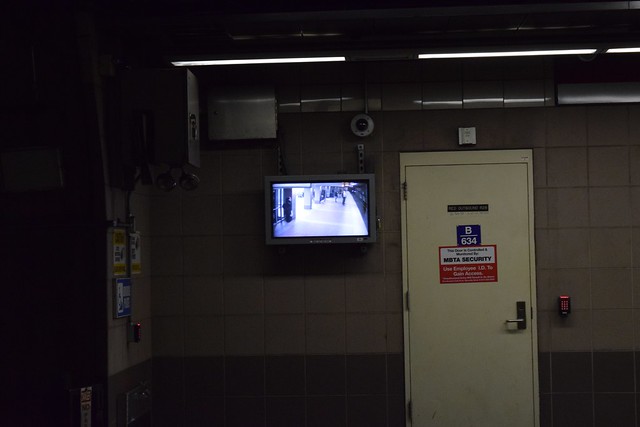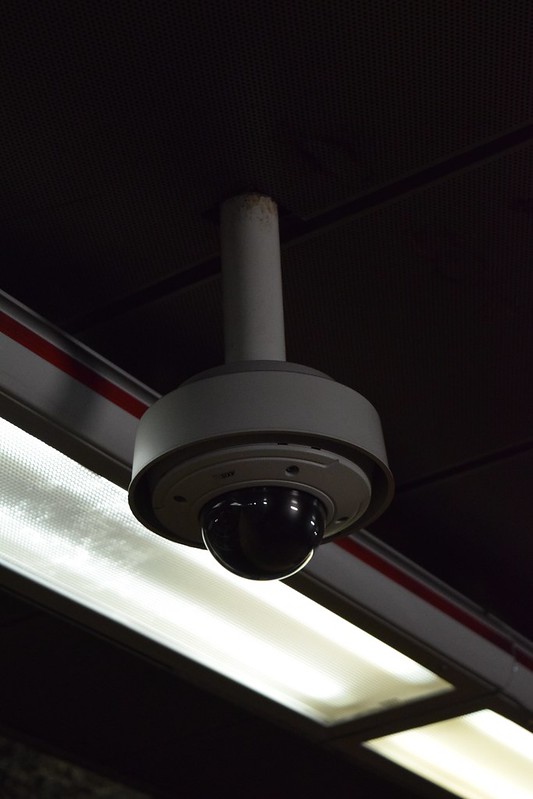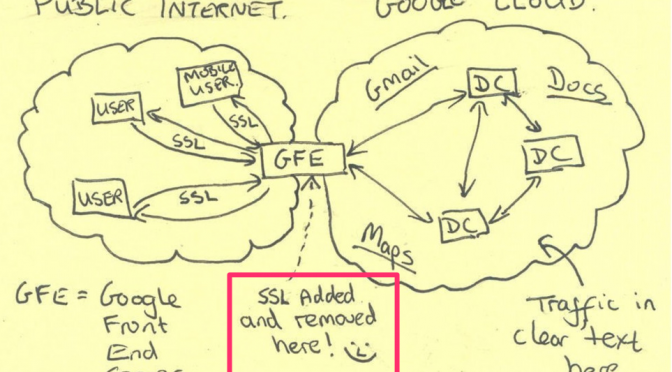Took some photos of the surveillance cameras at the South Station MBTA stop. They are up at my Surveillance album.
Category Archives: Privacy & Surveillance
SSL Migration Progressing (Updated)
Update: I have installed SSL certificates for all of my sites which have images on this site. All of the side bar images are back up.
One of the reasons I migrated from Typepad to another hosting provider, was so I could enable SSL on my site. Making sure your site supports SSL is the one of the basic efforts you can do to support encrypting the web.
I set it up for my main domain a few weeks ago, but since some of the images I use are on sites that didn’t use https, my blog did not appear to be completely secure.
I have adding SSL to two of my (sub-)sites, and will finish the rest tomorrow. I have removed the non-SSL widgets so the site shows a nice green lock and will add them back then they are all set. As an added bonus, I removed a bunch of tracking javascript that Typepad adds to their photo galleries that I don’t need.
One up shot of this effort is that I have a nice set of instructions that work for my setup which will help speed the process in the future.
Video of Cory Doctorow speaking at Suffolk University
Cory Doctorow and others spoke at the Ford Hall Forum at Suffolk University on Oct. 13, 2015. The talk was The Remote-Controlled Society. It was a pleasure to work with Suffolk and the Boston University Computer Science department to make this talk happen.
I recorded some of it and put it up at the Massachusetts Pirate Party YouTube account. Reminder to self: always use a tripod when recording video.
The Ford Hall Forum posted video of the entire discussion.
He also spoke at the Berkman Center that same day.
Boston Security Meetup Talk
I gave a brief talk on the state of government and corporate surveillance at today’s Boston Security Meetup. My slide deck is available in PDF and Open Document Format. Thanks to Akshat, Will, Ryan, Alex, Max, Chris, Lucy and everyone else who made this meetup possible. Thanks also to LogMeIn for hosting.
You can sign up for the Massachusetts Cryptoparty email list. The next cryptoparty will be Wednesday, Feb. 24th, 6-9pm, at Parts & Crafts, 577 Somerville Ave, Somerville.
Supreme Court Kills 4th Amendment On-line
Posted this at masspirates.org on 2/27/2013.
Yesterday the Supreme Court killed our 4th Amendment right to privacy on-line. In a 5-4 vote, they ruled that the ACLU and other plaintiffs did not have standing to bring their case challenging the FISA Amendments Act that allowed warrantless wiretapping. Since they concluded that “a fear of surveillance does not give rise to standing” and such warrantless government surveillance is secret, no one can challenge the Constitutionality of such surveillance. This Catch-22 is a recipe for unchecked government power.
We now know that the NSA’s secret domestic intelligence program has a name: Ragtime. According to a new book, Deep State: Inside the Government Secrecy Industry, about three dozen NSA officials have access to Ragtime’s surveillance
data. Additionally, a small number of people in the NSA’s general counsel’s office review the list of citizens surveilled to make sure they have connections to al-Qaeda. While Ragtime may only be able to process 50 different data sets at one time, the facility
that the NSA is building in Utah will likely increase that number as well as allow the NSA to store larger amounts of our communications for increasingly longer periods of time.
Doubtless some will say that the existing NSA safeguards are enough to protect innocent people from getting caught up in a government dragnet. However, recent surveillance of the Occupy movement, COINTELPRO and Watergate show government officials will use their power to go after even peaceful dissent. The 4th Amendment was a check on that power. A check that five members of the Supreme Court, many of whom claim to want to return the Constitution to the original intent of the Founding Fathers, feel we don’t need on-line.
It is up us to protect our privacy and overturn such unjust and undemocratic laws. We cannot trust those in power to do it.
So you think you have privacy?
I caught the tail end of the Enemies of the State talk from this year's Chaos Communications Congress 29C3 Panel. US Department of Justice ethics advisor Jesselyn Radack, as well as Thomas Drake and William Binney, who had significant positions in the NSA, talked about being whistleblowers and the increase of the US surveillance state.
In light of the recent Senate vote to allow the US government, basically the National Security Agency (NSA), to secretly spy on everyone (including anyone in the US) without judicial oversight, I highly recommend that you watch it. We can pretty much kiss our 4th Amendment rights good bye for the next five years. Better start to encrypt everything you send out on the Internet.
Speaking of US government surveillance, tonight I plan to read as much as I can about the Partnership for Civil Justice’s FOIA of FBI materials on Occupy Wall Street. Naked Capitalism has a great write up - Banks Deeply Involved in FBI-Coordinated Suppression of “Terrorist” Occupy Wall Street, as does Naomi Wolf, and a bit by Glenn Greenwald. Then of course there is the Partnership for Civil Justice's summary, and the actual (redacted) documents. More later.
Videos from Boston CryptoParty Available
The Boston CryptoParty was a success with over 50 people
participating in it. We recorded most of the talks, but haven't
processed them all. The following are done:
- Truecrypt/LUKS, OTR, Secure VoIP/SIP w/ Jitsi, Bitcoin & data liberation
- Counter surveillance by David House of the Bradley Manning Support Network & Andrew Lewman of the Tor Project Part 1 Part 2
- Encrypt to Live talk by Andrew Lewman of the Tor Project
Additionally, raw videos from a number of the talks are at the Tor Project.
The world the plutocrats wish for us
Naked Capitalism is rapidly becoming my favorite blog on economics & finance issues. Yves Smith (pseudonym) and her fellow bloggers always bring insights and clarity to the post-2008 financial crisis world. Even though I read it almost daily, I missed this article (no doubt due to the title), and only became aware of it via the Dollars & Sense blog.
It succinctly expresses my own views of the world that our plutocrats and their supporters envision for us and have been working since the 1970s to achieve bit by bit. Throw in increasing government and corporate surveillance, laws like SOPA & CISPA and corporations increasing attempts to enclose the internet commons for their private profit, and we have a vision of a future where all but a few are slaves. A future that may not be all that different than the ancient Roman Republic during the Servile Wars, only with means of control that are totalitarian in all but name.
I need to go support Naked Capitalism, but I hope you will find that Yves Smith's words clarify the reality we all face.
“My sense is that the widespread sense of gloom, the increased level of aggression in many walks of life (and on the Internet) isn’t just due to the lousy state of the economy, although that certainly isn’t helping. In the last year, it has become increasingly evident that a very ugly set of changes that will have broad social impact is moving forward with surprising speed.
“We are in the midst of a finance-led counterrevolution. The long standing effort to roll back New Deal reforms has moved from triumph to triumph. The foundation was laid via increasingly effective public relations efforts to sell the Ayn Randian world view that granting individuals unfettered freedom of action would produce only virtuous outcomes, since the talented would flourish and the rest would deservedly be left in the dust. In fact, societies that have moved strongly in that direction such as Pinochet’s Chile and Russia under Yeltsin, have seen plutocratic land grabs, declining standards of living (and even lifespans), and a rise in authoritarianism or (in the case of Colombia) organized crime. Those who won these brawls did flourish, but at tremendous cost to society as a whole.
“In the US, the first step was making taxation less progressive. A second, parallel measure was deregulation, particularly in financial services. Together, they fostered the growth of an uber wealthy cohort that increasingly lives apart from middle class and poor citizens. The rich can thus tell themselves they have little to gain from the success of ordinary people. And, perversely, the global financial crisis has worked to the advantage of the financial elite. As former IMF chief economist Simon Johnson described in a May 2009 Atlantic article, the US instead suffered a quiet coup, with the top end of the financial services industry becoming more concentrated, and more firmly in charge of the political apparatus. And you see more vivid evidence of the financial takeover in Europe, where technocrats are stripping countries of their sovereignty and breaking them on the rack via failing austerity programs, so as to avoid exposing the insolvency of French and German banks. In the US, the events of the last year are less dramatic but no less telling, including a coordinated 17-city paramilitary crackdown on Occupy Wall Street, a “get out of jail almost free” settlement for the mortgage-industrial complex, and an election where the two candidates are indistinguishable in their enthusiasm for cutting Medicare and Social Security, and murder by drone.
“The implications of gutting social protections are far more serious than they might appear. Dial the clock back eighty years, and most people lived in or near the communities they grew up in. They could turn to extended family, or other members of the community for support if they suffered a serious setback. Informal social safety nets stood in the place of the government provided ones we have now.
“Broadly shared prosperity and government safety nets are essential underpinnings of a modern, mobile society. The American nuclear family isn’t just an outgrowth of the automobile era; it’s also the result of union jobs in an industrial economy helping create a wage foundation, and the high confidence most men (in those days, it was men) had in continued employment, and the existence of social protections if something bad happened (Social Security’s disability programs have raised entire families, for instance) made it viable to move far from one’s hometown in pursuit of opportunity.
“But as the population has become more mobile, the role of community, and their local support mechanisms, has faded. Yes, when people get desperate, they might still move in with a parent or child. But anecdotally, that seems far less common today than it was a few generations ago. So when government provided social insurance programs are gutted, the broader social impact is much greater than taking us back to the era right before they were implemented. Michael Hudson has described the changes under way as neo-feudalism. We are moving towards the sort of stratified society we had not in the 1920s, but in the early Industrial Revolution with a landed aristocracy, a small haute bourgoisie, some well remunerated craftsmen, and a large agricultural/servant class. In other words, the effort to roll back the New Deal is in fact going much further, in terms of reinstitutionalizing class stratification, lack of mobility, and a resulting large new “lower order” that will live in stress and often squalor. A new, more brutal society is being created before our eyes, and it seems such an incredible development that many people are still in denial about what is happening.”
A Drone for you, and two for you …
Naked Capitalism brought my attention to this video on what drones can do and what they might do in the future. It makes for rather concerning viewing.
Personally, I have no doubt that within the next ten years, drones will be small enough and cheap enough to follow us and record all of our actions in public. My guess is that many of us will have more than one permanently following us. My guess is that people will object to governments tailing us with a drone, though I wouldn’t put it past them. However, I wouldn’t put it past corporations to monitor the public lives of their employees or ex-spouses for that matter. I am sure that many might have them to monitor themselves. The government could then use a warrant (or not) to gather the recordings.
I keep thinking of writing a story of woman as she goes about her day, from greeting the drones that keep track of her in the morning to saying good night to them, and everywhere in between. There would be one from the corporation she works for, one from her ex-husband, one from her child’s school, one from the school where she takes night classes, and so on. The cheaper drones become, the more we will use them, afterall. If you want to write such a story, you have my blessing, though please contact me so I can promote it.
On to the video.
Obama and the permanent terror war
By now some of you have heard about or read the recent Washington Post story by Greg Miller about the Obama administrations efforts to make permanent its powers to kill anyone on the planet in the name of the war on terror. Glenn Greenwald, talking about the Post story and citing work by the ACLU of Massachusetts on the government's continuing attempts to increase their surveillance of us all, paints this chilling picture:
What has been created here – permanently institutionalized – is a highly secretive executive branch agency that simultaneously engages in two functions: (1) it collects and analyzes massive amounts of surveillance data about all Americans without any judicial review let alone search warrants, and (2) creates and implements a "matrix" that determines the "disposition" of suspects, up to and including execution, without a whiff of due process or oversight. It is simultaneously a surveillance state and a secretive, unaccountable judicial body that analyzes who you are and then decrees what should be done with you, how you should be "disposed" of, beyond the reach of any minimal accountability or transparency.
As if this were not bad enough, we know we have entered new territory in the destruction of our rights when a government official likens drone strikes to swatting flies as in this quote from Micah Zenko's Council on Foreign Relations post, Institutionalizing America’s Targeted Killing Program:
“It really is like swatting flies. We can do it forever easily and you feel nothing. But how often do you really think about killing a fly?”
Will you are I be a fly to some future administration? If we are, as Spencer Ackerman at Wired noted, we can thank Obama for that.


